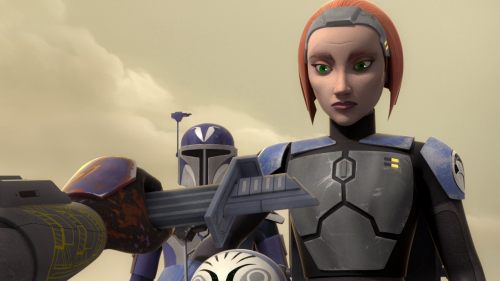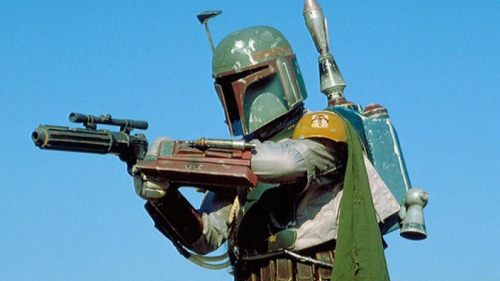Decoding THE RISE OF SKYWALKER’s Creative Process
Bad movies often get blamed on the writers, but when it comes to big-budget studio productions, it’s more complicated than that. We think of “great writers” as visionaries, but many of the most sought-after writers are those who can solve problems, navigate multiple conflicting visions, and get the script done. They often write invisibly, and sometimes the original screenplays that get them employed never get produced. In this high-pressure situation, the work often falls short of the writer's expectations due to one restriction or another. Star Wars: The Rise of Skywalker co-writer Chris Terrio told Awards Daily that, prior to Star Wars, he said he “would never ever go near a franchise again because there are so many compromises and so many chefs are in the kitchen.”
So much for that.
Terrio’s credits include both an Academy Award, for Argo, and a Golden Raspberry, for Batman V Superman: Dawn of Justice. People on the Internet seem to judge him on Dawn and Justice League. But what a lot of people miss, when judging writers on their IMDB credits (and this goes for any filmmaking craft), is that writing is a job. Terrio was hired to do a job on The Rise of Skywalker, alongside director JJ Abrams, and though the film’s critical reception has been justifiably negative, it’s important to remember just how hard their job was.
Abrams and Terrio joined the project in late 2017, just prior to the release of Rian Johnson’s The Last Jedi. Original Episode IX director Colin Trevorrow, hired due to Johnson not wanting to rush two films back-to-back, had been unceremoniously dropped for creative differences just prior. Now, Abrams and Terrio had to rush out the film, with a deck stacked against them. They had to close both a trilogy and a nine-film saga in just two years - eighteen months less than Johnson had - and though they scrapped Trevorrow’s draft, they likely had to work around pre-production assets that had already been created (like the Death Star wreckage sequence originally conceived for The Force Awakens). On top of all that, they then had to work around the death of an actor whose character had once been intended to anchor the film.

Realistically, the trilogy's problems started before Abrams and Terrio came on board. Longtime Pixar creative Michael Arndt's Episode VII script had been replaced with Abrams'. Johnson wrote and directed Episode VIII solo. Despite early reports that Johnson would write a treatment for Episode IX, Trevorrow and collaborator Derek Connolly forged ahead instead, only to be replaced themselves. Without a consistent creative voice guiding the story, this was always going to be a mess. Compounding the issue on The Rise of Skywalker, however, were the choices made by its new writers, in conjunction with studio heads or not. Many pre-established character and story possibilities were abandoned or reduced to clumsy lip service in favour of new ideas. We don't know the entirety of that process, but we do know how it began.
Many reviews have criticised The Rise of Skywalker as a checklist of fan-facing callbacks and references. But what's shocking is just how literal that checklist was. Abrams and Terrio's most significant addition was the return of Emperor Palpatine, introducing his family's existence at the last minute, but that’s only the beginning. Speaking to Polygon, co-writer Chris Terrio outlined part of the writing process that, in retrospect, reads pretty tellingly:
So we actually started with just a whiteboard. [...] Literally, just writing and asking, “What do we want to see happen? These characters, where do we want to see them go? What are the feelings that we want to have? What are the stories that we want to tell? What things do we feel were unresolved either from VII or from VIII or even from Episodes I, II, III, IV, V, VI?” [...It] eventually grew to be, like, 121 pages of things that we would like to see. Gradually, Darwinism takes over, and you cross out the things that aren’t quite making it.
[...] We went back and asked, “What about this strand? Was this little promise that was made in this episode ever fulfilled?” Or, “Here’s a little aspect of this character that seems kind of interesting and intriguing,” or, as J.J. would say, “There’s always been this line in Empire Strikes Back, and I always think about that line. What do you think that means?”
This outside-in, pushpins-and-yarn process sounds like a nightmare. Starting with payoffs to off eight other films is never going to result in a coherent movie. The Rise of Skywalker is a story constructed out of “moments,” held together by tenuous connective tissue, that does not emerge naturally from the characters and their needs. The payoffs are there, but they drown the movie.
Did everything The Rise of Skywalker pays off need to be paid off? Did Chewbacca need to be given a medal? Did Lando really need to return? Did the Death Star? Or Wedge Antilles? Did Palpatine’s story feel unresolved to...anyone? Would we have come away disappointed without knowing what colour Rey's lightsaber would be, or without proof positive of Leia training in the Force? Was a binary-sunset ending the best choice when The Last Jedi did the same thing two years earlier with a character for whom it was actually meaningful? And most importantly, was any of the above worth including at the expense of the characters the movie is actually about? No wonder the movie feels impatient.
And then there’s Leia.

There’s an improv game called Actor’s Nightmare, named for the Christopher Durang play of the same name, in which one improviser reads lines from a script while the other improvisers create dialogue around them as if they were part of the improvised narrative. It’s a fun justification exercise in an improvisational context, but you wouldn't write an actual script like that. You definitely wouldn't write a $300 million movie like that. Unless you're JJ Abrams and Chris Terrio.
Dealing with Carrie Fisher's death in Episode IX was always going to be a daunting task. Abrams' and Terrio's idea was ambitious. The pair created scenes for Leia based around outtakes from The Force Awakens: writing dialogue around Fisher’s lines and reactions, using body doubles for over-the-shoulder shots, digitally replacing Fisher’s costumes and surroundings, and using a prosthetic mask and dodgy CGI for one shot each. It's one of the film's most heavily-criticised elements.
That Abrams hyped this approach as a touching tribute is baffling in light of the dramatically inert, profoundly discomfiting end product. Watching the film, it's quickly and abundantly clear the filmmakers simply had insufficient material to accomplish their goals. Whole scenes are constructed around Fisher delivering vague single-word lines or handing off a lightsaber, clearly the only actual action they had footage of. The repurposed dialogue evokes Dead Men Don’t Wear Plaid without the jokes; worse, Leia's static body language recalls Ed Wood’s wife’s chiropractor standing in for the deceased Bela Lugosi in Plan 9 From Outer Space.
Like the creators of Arrested Development, whose awkward fourth season was cobbled together in post-production after actors' schedules prevented them from shooting together, Abrams appears to have been so preoccupied with the technical possibility of his editing sleight-of-hand, he wildly misjudged how well it would work dramatically. The ultimate effect is the squirm-inducing opposite of what was intended: it actually comes out feeling disrespectful. What's more, the Leia material reflects the film's wider issues.

Rise’s narrative chaos didn’t originate exclusively at the script stage, of course. Films often wrap principal photography only to discover they’re missing some coverage, or that certain story beats are unclear, or that a narrative choice simply didn’t end up working - so they rewrite, reshoot, and recut. The more rushed the project, the more fixes are usually required. The Rise of Skywalker bears all the hallmarks of big, unwieldy blockbusters made like this. Scene transitions are unwieldy. Characters bark dialogue purely to explain the plot. Sequences are created out of repurposed footage from other sequences. This is all normal practice, to varying degrees. It famously saved the original Star Wars, it visibly happened on The Force Awakens, and probably The Last Jedi too, and those movies turned out pretty well.
The problem with Rise is just how many aborted story threads are exposed by the patch-up job, left over from (or pasted over top of) screenplay drafts and workprints long abandoned. Abrams’ two Star Wars films bear so much evidence of post-production fixes that he comes across as the directorial equivalent of a cosmetic surgery addict, tinkering and tinkering until his film is more silicone than flesh. I’m desperate to see where it started, and from whence the alterations originated. If the released version is genuinely the better one, it speaks to how thankless writing and editing can be.
Conspiracy theories abound regarding this film, but the truth is probably dumber and more well-meaning than angry fans love to hate to believe. Terrio’s post-release explanations have only aggravated matters, failing to adequately explain the film’s perceived slights against The Last Jedi and exposing some weird leaps in logic taken by the writers. All the backtracking and re-explaining is testament to the fanbase’s willingness to nitpick, but also to the messiness of a film pieced together like a mechanical puzzle, where emotion is a mere tool to advance the plot. Like an improv scene whose performers keep having to justify random offers, The Rise of Skywalker came out feeling written backwards, reverse-engineered from a laundry list of micro-level goals.
We all make bad decisions under pressure. We don’t all have billion-dollar movie franchises riding on them. I don’t presume to know the full story, nor to claim that I could have done a better job - films are made under the circumstances they're made under. But Lucasfilm would be wise to heed the lessons of this film and its surrounding trilogy. Stories will always play out most effectively with an ending in mind, but they have to come from the characters, and they have to be given adequate time to gestate. The Rise Of Skywalker's whiteboard bullet points might have hit their targets, but they also shot the movie full of holes.



